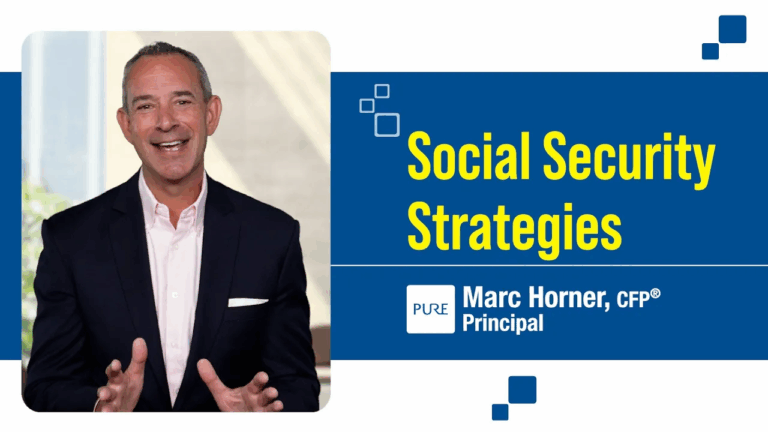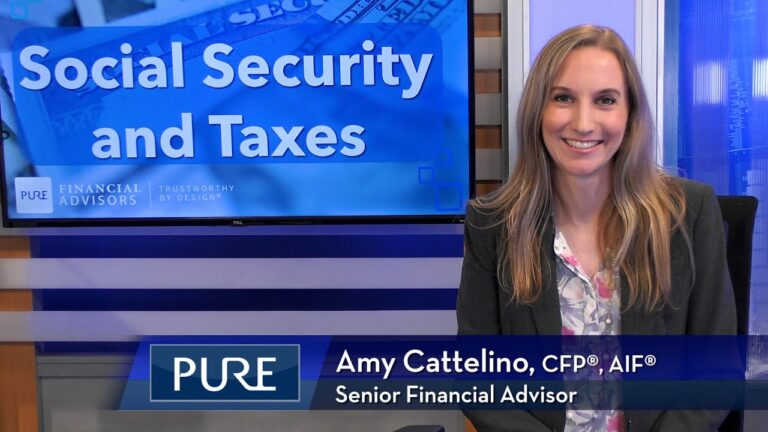Medicare planning is a crucial aspect of retirement preparation, yet the cost of healthcare is often one of the most overlooked or underestimated factors. To help you navigate this essential part of your retirement strategy, Pure’s Senior Financial Advisor, Peter Keller, CFP®, AIF®, addresses the top questions about Medicare, helping you find the best healthcare options in preparation for retirement.
He answers:
- Who is eligible for Medicare Part A?
- What types of services are covered under Medicare Part B?
- What is a Medigap policy?
- And more!
FREE GUIDE | Medicare Checkup Guide
Transcript
Medicare is federal health insurance for anyone age 65 and older, and some people under 65 with certain disabilities or conditions. Medicare has two parts, Part A which is hospital insurance, and Part B which is medical insurance.
Who is eligible for Medicare Part A (hospital insurance)?
If you have worked at least 10 years in Medicare covered employment, you will qualify for premium free Medicare Part A which is hospital insurance. To qualify, you must be:
65 or older; or disabled and receiving disability benefits from Social Security for 24 months; or have permanent kidney failure treated with dialysis or a transplant.
Will I automatically be enrolled in Medicare when I turn 65?
Yes, you’ll automatically be enrolled in Medicare Part A (Hospital Insurance) and Part B (Medical Insurance) when you turn 65 if you’re already receiving Social Security retirement benefits. If you’re not receiving Social Security or aren’t eligible for Social Security retirement, you won’t automatically be enrolled in Medicare. About three months prior to your 65th birthday or 24th month of disability, you will be sent an Initial Enrollment Package that will contain information about signing up for Medicare.
What types of services are covered under Medicare Part B?
Medicare Part B is often referred to as medical insurance and helps pay for doctors’ services, outpatient hospital care, blood, medical equipment and some home health services. It also pays for other medical services such as lab tests and physical and occupational therapy. Some preventive services such as mammograms and flu shots are also covered.
What medical supplies and equipment does Medicare Part B cover?
Medicare Part B helps pay for durable medical equipment such as oxygen equipment, wheelchairs, and other medically necessary equipment that your doctor prescribes to use in your home. Medicare pays for different kinds of durable medical equipment in different ways. Some equipment must be rented, other equipment must be purchased.
Does Medicare pay for prescription drugs?
Generally, Original Medicare – Medicare Part B (Medical Insurance) includes limited drug coverage such as immunosuppressive drugs (for transplant patients) and oral anti-cancer drugs. It does not cover prescription drugs or most drugs you get at the pharmacy. Medicare Part D, also known as the Medicare prescription drug benefit, is a voluntary program that helps Medicare beneficiaries pay for prescription drugs. Part D plans are sold by private insurance companies and contract with the federal government.
What is a Medigap policy?
Supplemental insurance policies are sometimes called Medigap plans. Medigap plans are private health insurance policies that cover some of the costs the Original Medicare Plan does not cover.
I didn’t enroll in Medicare Part B when I turned 65 because I was still working. Can I enroll now?
If you sign up during the Special Enrollment Period, you do not have to pay the Part B premium surcharge. You can enroll in Part B: any month in which you are still covered under your current enrollment; or the 8-month period beginning with either the date your employment ends or the date your group health plan ends, whichever comes first. You should contact the Social Security Administration to file an application.
Who submits my bills to Medicare? How much do I have to pay?
If you are in Original Medicare, your doctor or other health care provider will file your claim with Medicare. You’ll receive a statement showing how much you’ll need to pay. If you do not receive a Medicare statement (Medicare Summary Notice or Explanation of Medicare Benefits), you’ll need to contact your local carrier to have them send you a copy. If you have supplemental insurance or Medigap, they may pay part of your costs. Check with your supplemental insurance company to find out what they will pay.
What is a Medicare deductible?
A deductible is the amount you must pay each year before Medicare begins paying its portion of your medical bill. There are deductibles for both the Part A (Hospital Insurance) and Part B (doctor services). Your deductible is taken out of your claims when Medicare receives them. Medicare will not start paying on your claims until you have met your annual deductible. If you have any questions on the status of your deductible contact your Medicare carrier.
If you have any questions about how Medicare affects your retirement, contact Pure Financial for a free financial assessment.
Subscribe to our YouTube channel.
IMPORTANT DISCLOSURES:
• Investment Advisory and Financial Planning Services are offered through Pure Financial Advisors, LLC, a Registered Investment Advisor.
• Pure Financial Advisors LLC does not offer tax or legal advice. Consult with your tax advisor or attorney regarding specific situations.
• Opinions expressed are subject to change without notice and are not intended as investment advice or to predict future performance.
• Investing involves risk including the potential loss of principal. No investment strategy can guarantee a profit or protect against loss in periods of declining values.
• All information is believed to be from reliable sources; however, we make no representation as to its completeness or accuracy.
• Intended for educational purposes only and are not intended as individualized advice or a guarantee that you will achieve a desired result. Before implementing any strategies discussed you should consult your tax and financial advisors.
• Pure Financial Advisors, LLC, is not affiliated with any government agency, including, but not limited to Medicare.
CFP® – The CERTIFIED FINANCIAL PLANNER™ certification is by the Certified Financial Planner Board of Standards, Inc. To attain the right to use the CFP® designation, an individual must satisfactorily fulfill education, experience and ethics requirements as well as pass a comprehensive exam. Thirty hours of continuing education is required every two years to maintain the designation.
AIF® – Accredited Investment Fiduciary designation is administered by the Center for Fiduciary Studies fi360. To receive the AIF Designation, an individual must meet prerequisite criteria, complete a training program, and pass a comprehensive examination. Six hours of continuing education is required annually to maintain the designation.












